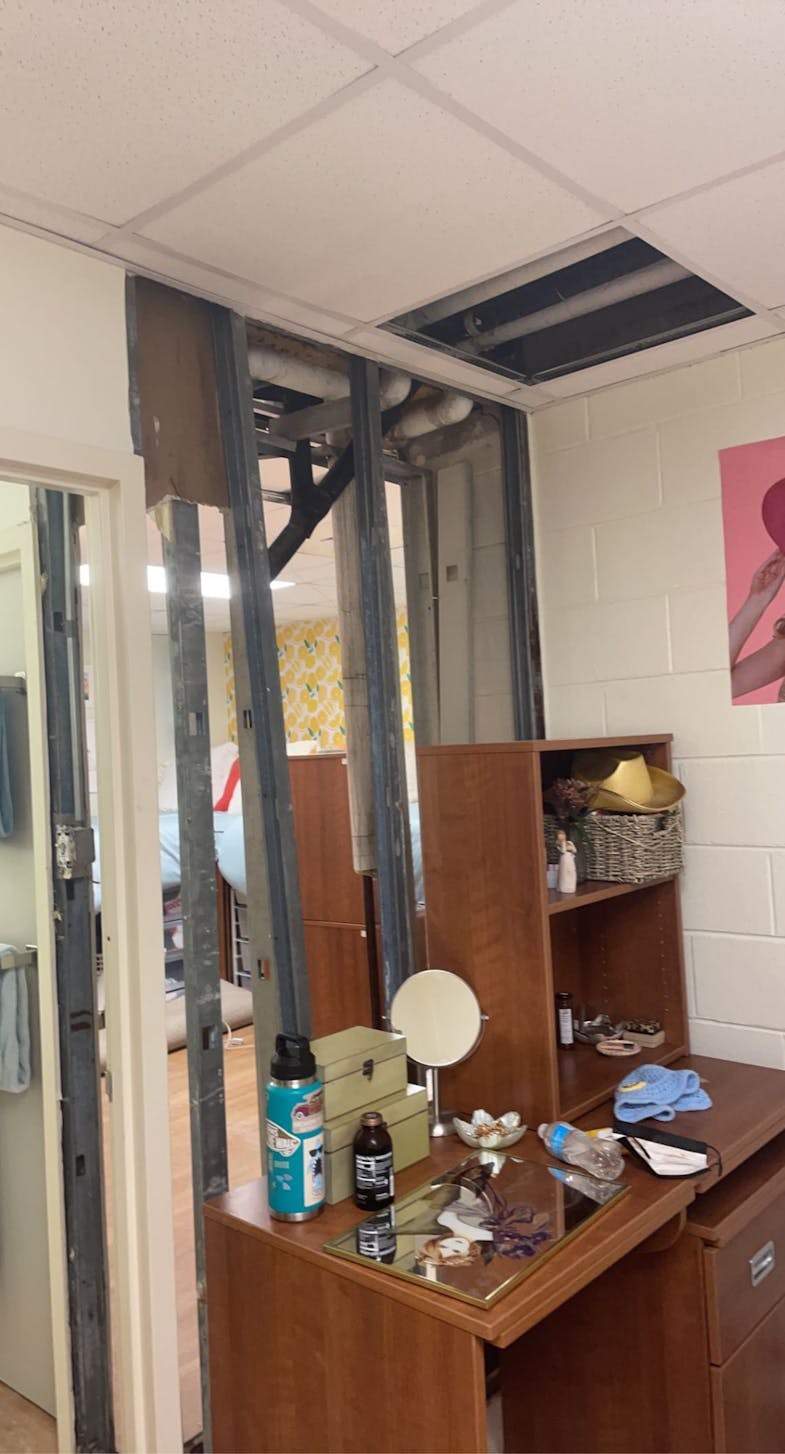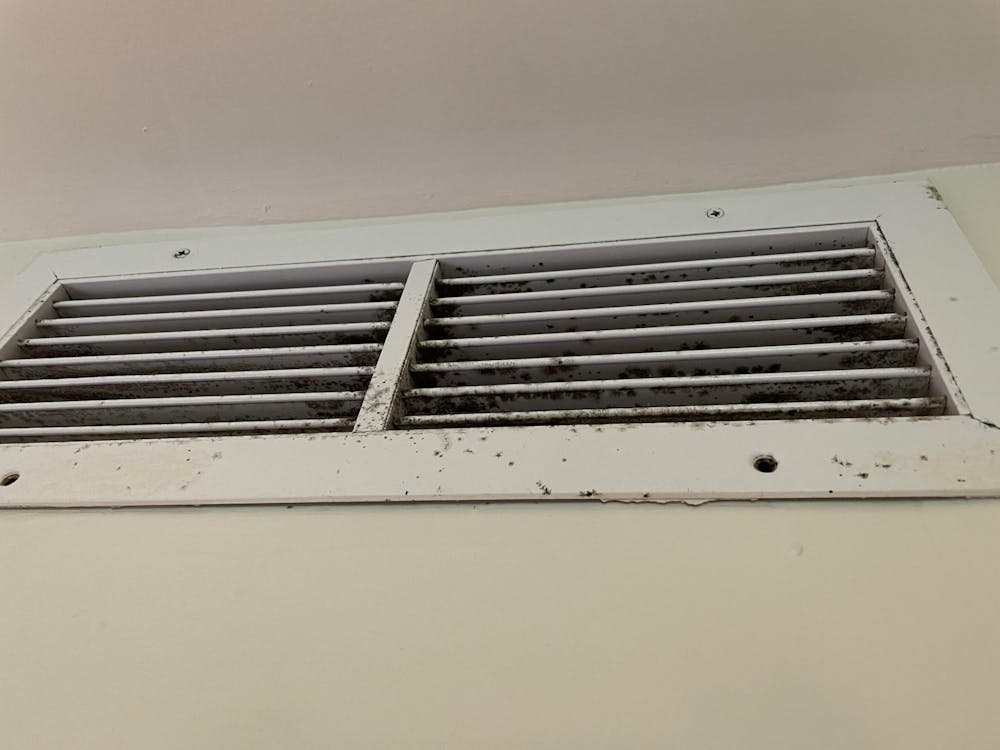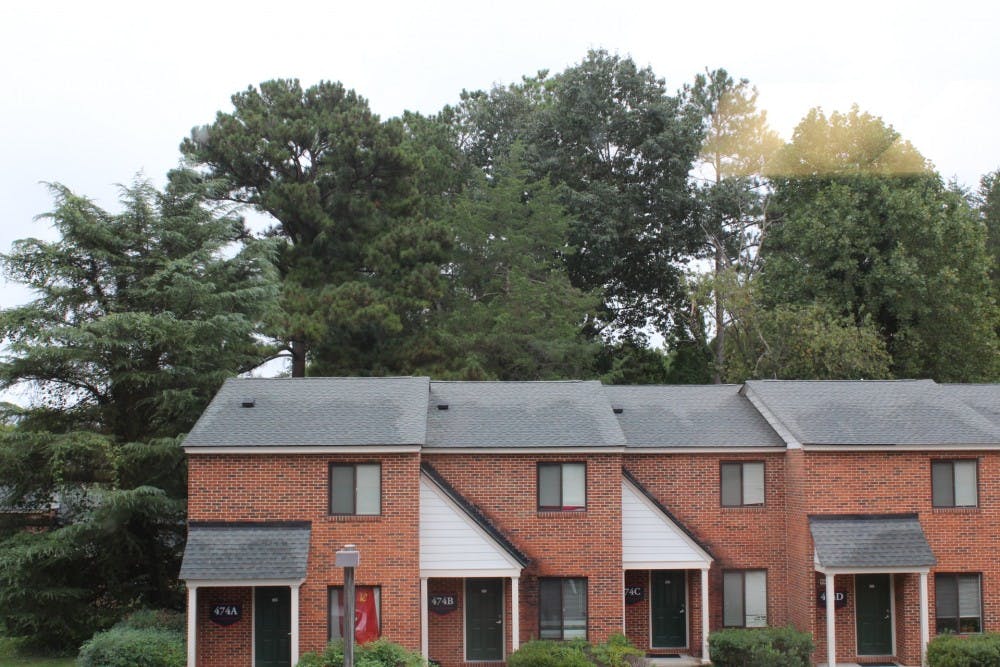Multiple students in Gray Court, Marsh Hall, Moore Hall and the University Forest Apartments submitted mold complaints to the UR facilities department during the first weeks of the fall semester.
“We do not have a mold problem,” Director of Residence Life and Housing Patrick Benner wrote in an email on Sept. 17 to The Collegian. “Students should be aware that seasonal changes, personal behaviors and HVAC systems impact indoor air quality concerns.”
UR sophomores Alafair Cutler and Jane Hill said they had found mold on their ceiling tile after moving into Gray Court on Aug. 21. UR facilities staff removed the ceiling tile that afternoon and said no further room inspection would be necessary until the next week. When workers returned to the Gray Court suite on Monday, they found mold covering the inside of a wall between two suite-style rooms.
“We were in and out of our room on our first day of classes, just trying to get settled, and these men were just completely tearing down our wall,” Cutler said.
The discovery was followed by days of work to tear down, reconstruct and repaint the wall. Cutler and Hill’s suitemates could see each other lying in bed from their respective rooms with both sides of the connecting wall removed, they said.

University of Richmond Facilities staff deconstructed the connecting wall between suite-style rooms in Gray Court. Photo courtesy of Jane Hill.
For community members who are allergic to mold, asthmatic, suffer from chronic lung disease or are immunocompromised, mold exposure may trigger reactions, sickness or the development of respiratory symptoms, according to the Center for Disease Control. Common symptoms of mold exposure include stuffy nose, sore throat, coughing, wheezing and skin rash, according to the Center for Disease Control.
“I am very allergic to mold,” Hill said. “I’ve had it in my blood before, and it’s been really dangerous for me.”
Hill said UR had provided the Gray Court residents with an air purifier that broke and leaked in their room, leading her to purchase a new one herself.
Christina Caluori and Olivia Pollack are among multiple first-year students living in Moore Hall and Marsh Hall who purchased air purifiers to improve the air quality in their rooms.
Marsh and Moore Hall residents were informed on Aug. 27 that the fresh air control system, which dehumidifies air coming into the buildings, was not functioning properly, according to an email from the facilities department. Residents were advised to keep bedroom windows closed to allow the air conditioning to operate at maximum function.
“Each room in Marsh and Moore Hall will have their individual fan coil units inspected and/or cleaned today by facilities to ensure proper functioning,” according to the email.
Enjoy what you're reading?
Signup for our newsletter
UR thoroughly cleaned the residence halls over the summer, including the fan coil units in the rooms, Benner said.
“A year ago, we equipped each fan coil unit with a bipolar ionization device to help reduce or eliminate airborne contaminants,” he said.
Bipolar ionization is an emerging technology installed in HVAC systems and portable air cleaners to remove viruses from the air. There is little data available however to validate the safety and efficacy of bipolar ionization outside of lab conditions, according to the United States Environmental Protection Agency.
Ashleen Hughes, a first-year resident of Marsh, experienced possible mold exposure symptoms during orientation week, she said. Hughes moved into a hotel for a night and her symptoms subsided once she slept out of her dorm room.

A resident of Marsh Hall on Aug. 26 forwarded an image of an air vent covered in mold in response to an email from an RA addressing mold complaints. Photo courtesy of Jack Manigan.
Some UFA residents have also experienced possible mold exposure symptoms and submitted work request forms to UR facilities to test for mold in their apartments.
“My apartmentmate and I are both really allergic to mold and have been sick over the last week,” Helen Strigel, a resident of the UFA 162 block, said.
Strigel said she had requested a mold test in her apartment on Sept. 7 and had awaited test results for more than a week after inspection.
Benner encouraged students with mold concerns to contact the UR facilities team.
Contact news writer Katie Grogan at katie.grogan@richmond.edu.
Support independent student media
You can make a tax-deductible donation by clicking the button below, which takes you to our secure PayPal account. The page is set up to receive contributions in whatever amount you designate. We look forward to using the money we raise to further our mission of providing honest and accurate information to students, faculty, staff, alumni and others in the general public.
Donate Now



